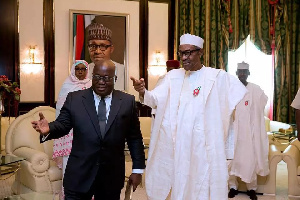More than a year after it closed its land borders, Nigeria is considering reopening them as soon as possible, according to its President, Muhammadu Buhari.
The announcement was made during a meeting with governors on the platform of the ruling All Progressives Congress (APC) in Abuja.
Sources say Nigeria first showed its willingness to re-open the border last month, amid skyrocketing food prices [inflation] and increased calls for reopening of the borders. Nigeria’s move was to control the smuggling of goods from neighboring countries.
Speaking on the Market Place on Joy News, President of the Ghana Union of Traders Association (GUTA), Dr. Joseph Obeng, argued that Nigeria’s intent is firmly based on the economic recession the continent’s largest oil producer faced in the wake of the border closure.
“Their economy is trembling. Nigeria is in recession, their action has affected them negatively. This decision to reopen borders further confirms my argument that no country can operate or trade in isolation. It must be a lesson to them,” he stated.
The closure of the Nigeria-Benin Border saw Ghanaian exporters complain massively over the impact it had on trading activities as well as profit margins.
So far, beverage firm Kasapreko had revealed the border closure resulted in about GH¢2 million loss in profit in just about two months.
As it stands now, the Nigerian government insists there will be a reopening of the border only if Benin meets all 13 of the trade conditions.
The Executive Secretary of the Ghana International Trade Commission (GITC), Frank Agyekum said the intent by President Buhari is welcoming.
“Unfair trade practices sometimes happen among members of an economic bloc as ECOWAS. The more reason for dialogue and negotiations. We welcome this intent by Buhari but consensus building and trust is all that matters now especially as we gear up to the AfCFTA in 2021,” he stated.
Meanwhile, Public Relations Office of the Ministry of Trade and Industry, Prince Boakye, remarked that President Buhari’s intent goes a long way to make the Continental Free Trade Agreement a success.
“Gradually, we know that our negotiations with Nigeria paid off. We welcome the news of his intent,” he briefly submitted.
Many have attributed Nigeria’s economic recession partly to the border closure that has been in place since August 2019, which, among others, has seen inflation rise to a 30-month high.
Policy experts have said that lifting the blockade will help check the recession, the nation’s worst in decades, and ease the economic hardship faced by Nigerians.
Last month, the Minister of Finance Budget and National Planning, Zainab Ahmed, said President Buhari would soon receive a report of a presidential committee to advise on the reopening of the borders.
 Home Of Ghana News Ghana News, Entertainment And More
Home Of Ghana News Ghana News, Entertainment And More





